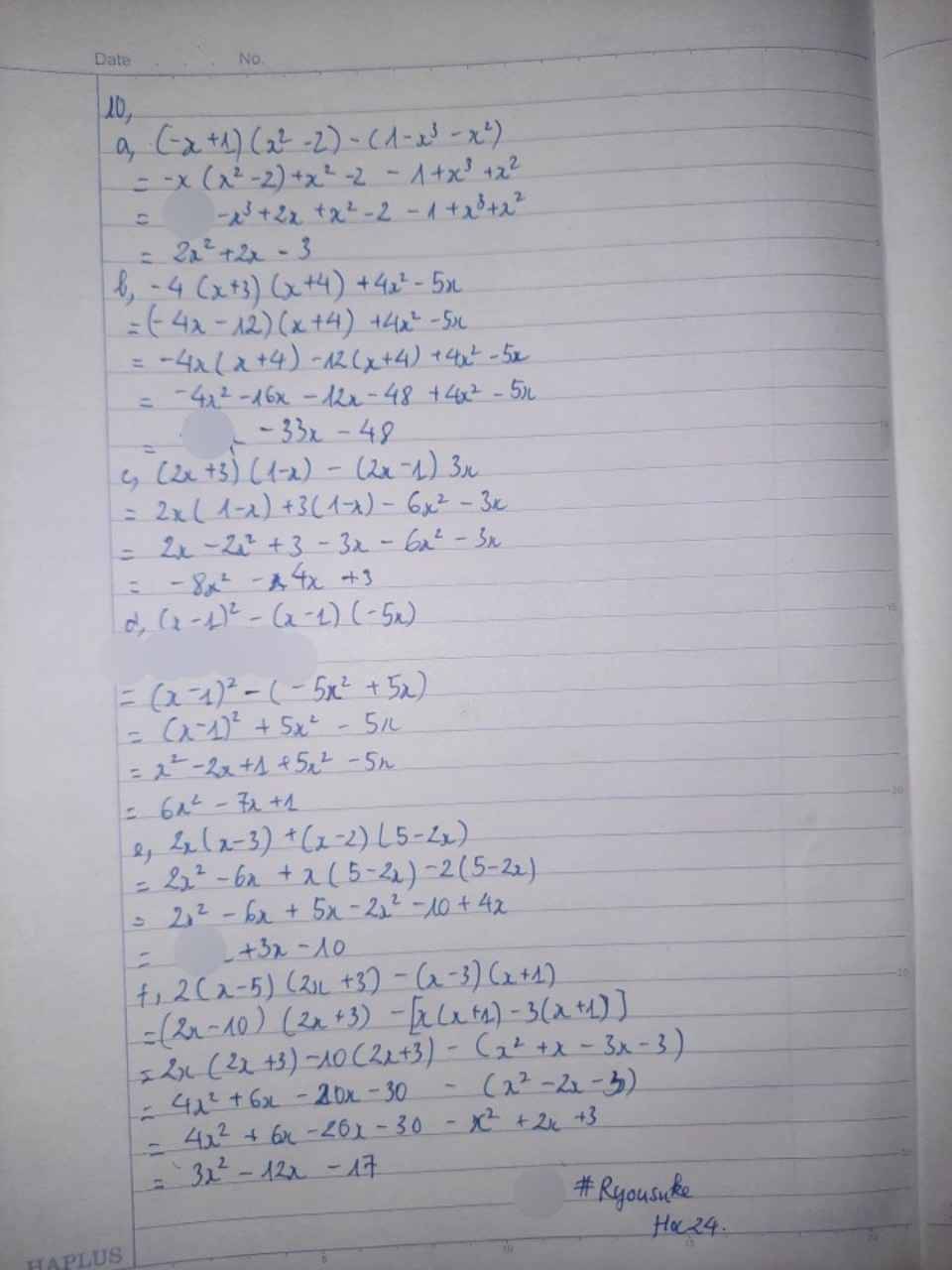
Hãy nhập câu hỏi của bạn vào đây, nếu là tài khoản VIP, bạn sẽ được ưu tiên trả lời.


`#3107.101107`
`1/2x + 4/5 = 2x - 8/5`
`=> 1/2x - 2x = -4/5 - 8/5`
`=> -3/2x = -12/5`
`=> x = -12/5 \div (-3/2)`
`=> x = 8/5`
Vậy, `x = 8/5`
_____
`\sqrt{x} = 5`
`=> x = 5^2`
`=> x = 25`
Vậy, `x = 25`
___
`x^2 = 3`
`=> x^2 = (+-\sqrt{3})^2`
`=> x = +- \sqrt{3}`
Vậy, `x \in {-\sqrt{3}; \sqrt{3}}.`

1: P(x)=M(x)+N(x)
=-2x^3+x^2+4x-3+2x^3+x^2-4x-5
=2x^2-8
2: P(x)=0
=>x^2-4=0
=>x=2 hoặc x=-2
3: Q(x)=M(x)-N(x)
=-2x^3+x^2+4x-3-2x^3-x^2+4x+5
=-4x^3+8x+2

cho B(x) = 0
\(=>-5x+30=0\Rightarrow-5x=-30\Rightarrow x=6\)
cho E(x) = 0
\(=>x^2-81=0\Rightarrow x^2=81=>\left[{}\begin{matrix}x=9\\x=-9\end{matrix}\right.\)
cho C(x) = 0
\(=>2x+\dfrac{1}{3}=0=>2x=-\dfrac{1}{3}=>x=-\dfrac{1}{6}\)
bạn tham khảo hai câu này nha vì mình ko biết là mấy câu còn lại
B(x)=-5x+30
cho B(x)=0
=> -5x+30=0
-5x=-30
x=-30:(-5)
x=-6
* Vậy nghiệm của đa thức B(x) là -6.
C(x)=2x+1/3
cho C(x)=0
=>2x+1/3=0
2x=-1/3
x=-1/3:2
x=-1/6
vậy nghiệm của đa thức C(x) là -1/6.

Áp dụng tính chất dãy tỉ số bằng nhau ta có :
\(\frac{x}{2}=\frac{y}{3}=\frac{2x}{2.2}=\frac{3y}{3.3}=\frac{2x+3y}{4+9}=\frac{26}{13}=2\)
\(\frac{x}{2}=2\Rightarrow x=2.2=4\)
\(\frac{y}{3}=2\Rightarrow y=2.3=6\)
Vậy x=4 và y=6
\(\frac{x}{2}=\frac{y}{3}\Rightarrow\frac{2x}{4}=\frac{3y}{9}\)
Áp dụng tính chất dãy tỉ số bằng nhau, ta có:
\(\frac{2x}{4}=\frac{3y}{9}=\frac{2x+3y}{4+9}=\frac{26}{13}=2\)
\(\frac{x}{2}=2\Rightarrow x=4;\frac{y}{3}=2\Rightarrow y=6\)


a) Ta có: \(\dfrac{2x}{3}=\dfrac{3y}{4}=\dfrac{4z}{5}\)
nên \(\dfrac{x}{\dfrac{3}{2}}=\dfrac{y}{\dfrac{4}{3}}=\dfrac{z}{\dfrac{5}{4}}\)
Áp dụng tính chất của dãy tỉ số bằng nhau, ta được:
\(\dfrac{x}{\dfrac{3}{2}}=\dfrac{y}{\dfrac{4}{3}}=\dfrac{z}{\dfrac{5}{4}}=\dfrac{x+y+z}{\dfrac{3}{2}+\dfrac{4}{3}+\dfrac{5}{4}}=\dfrac{49}{\dfrac{49}{12}}=12\)
Do đó:
\(\left\{{}\begin{matrix}\dfrac{2x}{3}=12\\\dfrac{3y}{4}=12\\\dfrac{4z}{5}=12\end{matrix}\right.\Leftrightarrow\left\{{}\begin{matrix}2x=36\\3y=48\\4z=60\end{matrix}\right.\Leftrightarrow\left\{{}\begin{matrix}x=18\\y=16\\z=20\end{matrix}\right.\)
Vậy: (x,y,z)=(18;16;20)
b) Đặt \(\dfrac{x}{5}=\dfrac{y}{3}=k\)
\(\Leftrightarrow\left\{{}\begin{matrix}x=5k\\y=3k\end{matrix}\right.\)
Ta có: \(x^2-y^2=4\)
\(\Leftrightarrow\left(5k\right)^2-\left(3k\right)^2=4\)
\(\Leftrightarrow16k^2=4\)
\(\Leftrightarrow k\in\left\{\dfrac{1}{2};-\dfrac{1}{2}\right\}\)
Trường hợp 1: \(k=\dfrac{1}{2}\)
\(\Leftrightarrow\left\{{}\begin{matrix}x=5k=5\cdot\dfrac{1}{2}=\dfrac{5}{2}\\y=3k=3\cdot\dfrac{1}{2}=\dfrac{3}{2}\end{matrix}\right.\)
Trường hợp 2: \(k=-\dfrac{1}{2}\)
\(\Leftrightarrow\left\{{}\begin{matrix}x=5k=5\cdot\dfrac{-1}{2}=\dfrac{-5}{2}\\y=3k=3\cdot\dfrac{-1}{2}=\dfrac{-3}{2}\end{matrix}\right.\)
Vậy: \(\left(x,y\right)\in\left\{\left(\dfrac{5}{2};\dfrac{3}{2}\right);\left(-\dfrac{5}{2};-\dfrac{3}{2}\right)\right\}\)
a)
Theo tính chất của dãy tỉ số bằng nhau, ta có :
\(\dfrac{x}{\dfrac{3}{2}}=\dfrac{y}{\dfrac{4}{3}}=\dfrac{z}{\dfrac{5}{4}}=\dfrac{x+y+z}{\dfrac{3}{2}+\dfrac{4}{3}+\dfrac{5}{4}}=\dfrac{49}{\dfrac{49}{12}}=12\)
Suy ra :
\(x=\dfrac{12.3}{2}=18\\ y=\dfrac{12.4}{3}=16\\ z=\dfrac{12.5}{4}=15\)
b)
\(x=\dfrac{y}{3}.5=\dfrac{5y}{3}\\ x^2-y^2=4\\ \Leftrightarrow\left(\dfrac{5y}{3}\right)^2-y^2=4\\ \Leftrightarrow\dfrac{16y^2}{9}=4\Leftrightarrow y=\pm\dfrac{3}{2} \)
Với $y = \dfrac{3}{2}$ thì $x = \dfrac{5}{2}$
Với $y = \dfrac{-3}{2}$ thì $x = \dfrac{-5}{2}$
c)
\(\dfrac{x}{y+z+1}=\dfrac{y}{z+x+1}=\dfrac{z}{x+y-2}=\dfrac{x+y+z}{2x+2y+2z}=\dfrac{1}{2}\)
Suy ra :
\(2x=y+z+1\Leftrightarrow y+z=2x-1\)
Mặt khác :
\(x+y+z=\dfrac{1}{2}\Leftrightarrow x+2x-1=\dfrac{1}{2}\Leftrightarrow x=\dfrac{1}{2}\)
\(2y=x+z+1=z+\dfrac{3}{2}\)
Mà \(y+z=0\Leftrightarrow z=-y\)
nên suy ra: \(y=\dfrac{1}{2};z=-\dfrac{1}{2}\)

Lời giải:
a.
$|2x-5|=12-3x$
Nếu $x\geq \frac{5}{2}$ thì $2x-5=12-3x$
$\Leftrightarrow x=3,4$ (thỏa mãn)
Nếu $x< \frac{5}{2}$ thì: $5-2x=12-3x$
$\Leftrightarrow x=7$ (loại)
Vậy......
b.
$4x=|x+1|+|x+2|+|x+3|\geq 0$
$\Rightarrow x\geq 0$
Do đó: $|x+1|+|x+2|+|x+3|=(x+1)+(x+2)+(x+3)=3x+6$
Vậy: $3x+6=4x$
$\Leftrightarrow x=6$ (thỏa mãn)
c.
$|x^2+|x+2||=x^2+3$
$\Leftrightarrow x^2+|x+2|=x^2+3$
$\Leftrightarrow |x+2|=3$
$\Leftrightarrow x+2=3$ hoặc $x+2=-3$
$\Leftrightarrow x=1$ hoặc $x=-5$
d.
$|x^2-3|=6$
$\Leftrightarrow x^2-3=6$ hoặc $x^2-3=-6$
$\Leftrightarrow x^2=9$ (chọn) hoặc $x^2=-3< 0$ (loại)
$\Leftrightarrow x=\pm 3$

\(a,-\dfrac{x}{2}+\dfrac{2x}{3}+\dfrac{x+1}{4}+\dfrac{2x+1}{6}=\dfrac{8}{3}\)
\(\Rightarrow-\dfrac{6x}{12}+\dfrac{8x}{12}+\dfrac{3\left(x+1\right)}{12}+\dfrac{2\left(2x+1\right)}{12}=\dfrac{8}{3}\)
\(\Rightarrow\dfrac{-6x+8x+3x+3+4x+2}{12}=\dfrac{8}{3}\)
\(\Rightarrow\dfrac{9x+5}{12}=\dfrac{8}{3}\)
\(\Rightarrow27x+15=96\)
\(\Rightarrow27x=81\)
\(\Rightarrow x=3\left(tm\right)\)
\(b,\dfrac{3}{2x+1}+\dfrac{10}{4x+2}-\dfrac{6}{6x+3}=\dfrac{12}{26}\)
\(\Rightarrow\dfrac{3}{2x+1}+\dfrac{10}{2\left(2x+1\right)}-\dfrac{6}{3\left(2x+1\right)}=\dfrac{6}{13}\)
\(\Rightarrow\dfrac{3}{2x+1}+\dfrac{5}{2x+1}-\dfrac{2}{2x+1}=\dfrac{6}{13}\)
\(\Rightarrow\dfrac{3+5-2}{2x+1}=\dfrac{6}{13}\)
\(\Rightarrow\dfrac{6}{2x+1}=\dfrac{6}{13}\)
\(\Rightarrow2x+1=13\)
\(\Rightarrow2x=12\)
\(\Rightarrow x=6\left(tm\right)\)
#Toru
a) \(-\dfrac{x}{2}+\dfrac{2x}{3}+\dfrac{x+1}{4}+\dfrac{2x+2}{6}=\dfrac{8}{3}\)
\(\Rightarrow\dfrac{-6x}{12}+\dfrac{8x}{12}+\dfrac{3\left(x+1\right)}{12}+\dfrac{2\left(2x+1\right)}{12}=\dfrac{4\cdot8}{12}\)
\(\Rightarrow-6x+8x+3x+3+4x+2=32\)
\(\Rightarrow9x+5=32\)
\(\Rightarrow9x=32-5\)
\(\Rightarrow9x=27\)
\(\Rightarrow x=\dfrac{27}{9}\)
\(\Rightarrow x=3\)
b) \(\dfrac{3}{2x+1}+\dfrac{10}{4x+2}-\dfrac{6}{6x+3}=\dfrac{12}{26}\) (ĐK: \(x\ne-\dfrac{1}{2}\))
\(\Rightarrow\dfrac{3}{2x+1}+\dfrac{10}{2\left(2x+1\right)}-\dfrac{6}{3\left(2x+1\right)}=\dfrac{6}{13}\)
\(\Rightarrow\dfrac{3}{2x+1}+\dfrac{5}{2x+1}-\dfrac{2}{2x+1}=\dfrac{6}{13}\)
\(\Rightarrow\dfrac{6}{2x+1}=\dfrac{6}{13}\)
\(\Rightarrow2x+1=13\)
\(\Rightarrow2x=12\)
\(\Rightarrow x=\dfrac{12}{2}\)
\(\Rightarrow x=6\left(tm\right)\)

(x+2)(x2-2x+4)-x(x-3)(x+3)
=x3+8-x(x2-9)
=x3+8-x3+9x
=9x+8
Vậy 9x+8=26 => 9x=26-8 => 9x=18 => x=2